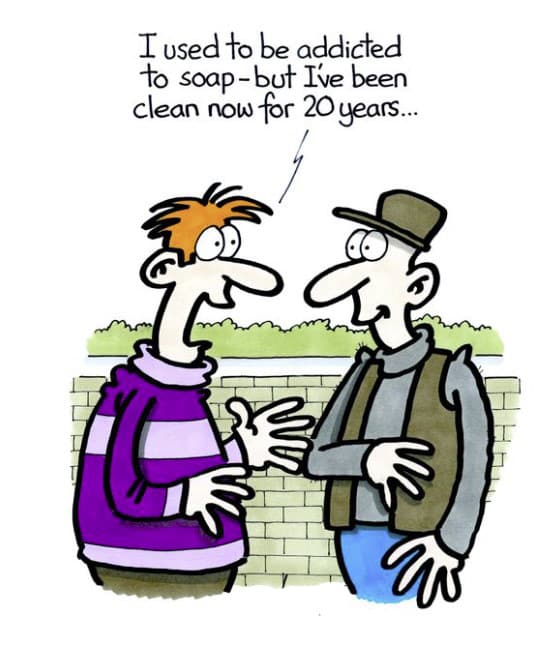
One or two of the Gorls weren’t overly enamoured with some of the recent offerings from this corner of your paper. ‘You are sailing a bit close to the wind’, Sabrina commented – scolding me with her eyes as she spoke. ‘I am not really surprised at what he writes’, added Verona. I presumed this to be a compliment until one of them went on; ‘however, I am surprised at your editor allowing such dirt to be printed.’ In enthusiastically agreeing that responsibility for any lowering of good taste in YCBS should rest squarely on the editor’s desk, my cowardly endeavour to shift the blame misfired and we all left separately.
‘Clean up your act’, was the parting shot from the last Gorl to leave. And so, dear readers, (those of you still on board!) we have decided to write a clean column this week – by way of a balancing act. This being so, could one write about anything cleaner than soap, I ask you. Did any of the Lads ever imagine they would have to read about soap in this column? Did this writer ever envisage doing an article on soap? ‘No’ is the answer to both questions.
On a recent visit to Marseille, my wife and I found ourselves standing outside a museum. Mrs Youcantbeserious loves museums – because that is what education does to people. This museum was very different from most of those austere buildings housing curious old stuff. This one was very different; a ‘soap museum.’ Nothing but soap in all shapes and sizes along with the machines that pressed and moulded the soaps over hundreds of years. The tour of this small museum turned out to be quite enthralling. It is amazing what you can learn about something we use in everyday life, without ever giving the object a second thought.
The museum is run by the granddaughter of one of the leading soap manufacturers based in the city. Marseille was once the soap capital of the world and at that time, one out of every two workers in Marseille worked in a soap factory. The lady we spoke to had such enthusiasm and a love for what she does, that it made the visit even more enjoyable.
We learned how one machine crushed the raw soap with a granite rolling mill that has remained the same for a hundred years. Then, using a mixer, the different ingredients such as essential oils, perfumes, lavender flowers, etc., are incorporated into the soap composition. The product obtained is put into a ‘plodder’ to compact it. Finally, the soap bar is cut manually, stamped or moulded. Soaps can be personalised here for weddings, business events, and so on.
Next door to the museum is a soap shop, selling nothing but soaps in every shape and size. Hundreds of different shaped soaps, and with hundreds of differing scents.
Away from Marseille, there are written recipes for soap, dating back nearly 5,000 years. Variations from places like Egypt, Rome and ancient Greece.
Soap likely originated as a by-product of a long ago cookhouse: Meat roasting over a fire and blobs of fat dropping into ashes. The result was a chemical reaction that created a slippery substance that was found to be great for shifting dirt off the skin and allowing it to be washed away. Nothing much changed over thousands of years and the American soap industry got started because of bacon and candles.
Modern soap makers – at least those working in small artisanal operations, still use the same techniques. The saponification process yields a thick slurry. As it solidifies, fat neutralises the caustic lye. ‘After 48 hours, you’ve got soap’ says Natalie Wong of Vancouver ‘Pep Soap’, which offers both vegetable and animal fat based bars.
The bar of soap you so rigorously scrub your hands with multiple times a day, is probably the most ancient consumer product you will use. One of the first soaps to gain national distribution was ‘Procter & Gamble’s Ivory’. It was introduced to compete with ‘Spanish Castile Soap’, around 1870.
When I was a boy, I thought there were only three kinds of soap; ‘carbolic’, ‘Lifebuoy’ and ‘Palmolive’. In those days, the then Radio Eireann, ran 15 minute sponsored programmes between 08.00 and 09.00 on weekdays. One such sponsored radio programme was hosted by Palmolive soap. The opening and closing slogan to the programme was; “Keep that school-girl complexion.” The girls I remember from Johnstown N.S were all lovely girls. But … and I don’t know how to say this; but either they weren’t listening, used some other brand of soap … or, Palmolive lied! It’s Ok … I used it – and it didn’t work for me either!
Don’t Forget
Folks would enjoy us much more, if we gave as much thought to our own behaviour as we do to our neighbour’s.





